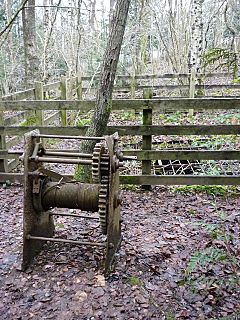Dog Hole Cave facts for kids
Quick facts for kids Dog Hole |
|
|---|---|
| Haverbrack Bank Pot | |

The cave entrance in January 2010
|
|
| Location | Storth, Cumbria, England |
| OS grid | SD 4826 8019 |
| Depth | 12 metres (39 ft) |
| Length | 6 metres (20 ft) |
| Elevation | 60 metres (200 ft) |
| Geology | Carboniferous limestone |
| Entrances | 1 |
| Difficulty | II |
Dog Hole Cave is a really interesting cave found near Storth, in Cumbria, England. It's also known by other names like Haverbrack Bank Pot, Haverbrack Dog Hole, and Fairy Cave. This cave is very important for understanding history because of the things found inside it.
The cave is mostly a deep hole, about 12 metres (39 ft) (39 feet) deep. It was dug out over time. At the bottom, there's a narrow passage about 6 metres (20 ft) (20 feet) long. The cave formed in a type of rock called Carboniferous limestone. This kind of rock is often found where caves form.
Contents
Exploring Dog Hole Cave
Dog Hole Cave has been explored and studied by different groups over many years. Each time, they learned more about its past.
Early Discoveries
In 1912, a researcher named J. W. ("Wilfred") Jackson was one of the first to dig in the cave. He found bones from farm animals like dogs and pigs. Some of these bones are now kept in the Natural History Museum, London.
Scouts and Later Research
In the 1950s, local Scouts also explored the cave. They found some very old human bones, which added to the cave's mystery. Later, in 2003, scientists from Liverpool John Moores University started new research. They continued to study the cave to learn even more about its history.
Protecting the Cave
In the 1980s, a gate was put at the cave's entrance. This was done to protect the important historical items inside. However, when scientists checked the cave again in 2003, they found that some of these old discoveries had been damaged. This shows how important it is to protect special places like Dog Hole Cave.
What We Learned from the Cave
Scientists use special methods to find out how old things are. They used a method called radio carbon dating on items found in Dog Hole Cave. This helped them figure out when people and animals might have used the cave.
Dating the Finds
The results showed that the cave was used during different periods of history. Some items date back to the Romano-British time. This was when the Romans were in Britain. Other items are from the Early Middle Ages, which was a time after the Roman Empire. These dates help us understand how people lived in Cumbria many centuries ago.
 | Emma Amos |
 | Edward Mitchell Bannister |
 | Larry D. Alexander |
 | Ernie Barnes |

